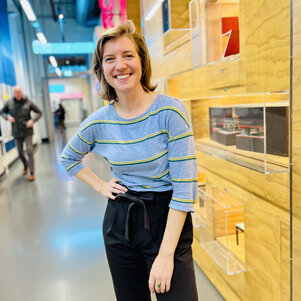The designers and engineers of the future are trained to find answers to major societal problems. The question is, however, what skills do they need to work on these challenges and in what kind of education can they acquire them? For her PhD research entitled 'Educating Uncertainty', Nina Bohm investigated how students and teachers deal with uncertainty in challenge-based education.
Learning and studying while tackling real-world problems is what challenge-based education is all about. Although this is of course motivating, there are no ready-made answers, particularly when it comes to sustainability issues. As Nina Bohm explains, “Uncertainty is about the things we don't know. And there are quite a few unknowns when it comes to sustainability. The future is unpredictable and the political landscape can change in an instant. Technology is continuing to evolve and there are always gaps in our knowledge. What is more, even the experts don’t always agree with each other. What, for example, should be treated as a priority when designing a new neighbourhood: green roofs or solar panels on the roof? Or should that roof be given a social function for the neighbourhood instead? These are the kinds of uncertainties students come up against when we ask them to formulate a solution.”
What is complex?
Nina studied urbanism in the TU Delft, but also has a background in science communication and experience in education development. She felt it was important to explore the concept of uncertainty in sustainability education. “When it comes to this kind of transdisciplinary education, where students engage with disciplines and people outside the university, the focus is often on ‘complex problems’. But what form does that complexity actually take? An important dimension of a complex problem is uncertainty. And if we ultimately want students to be able to deal with that uncertainty, we do need to find out how to teach that.”
For her PhD research Nina took a close look at various educational pathways in Delft and Amsterdam. She investigated, for example, how the university cooperates with the municipality, how subjects are taught there and exactly what the learning objectives are. She also took a deep dive into the Living Lab, a challenge-based subject of the Master's in Metropolitan Analysis, Design and Engineering (MSc MADE) in Amsterdam where students work on a complex challenge over a four month period. There, Nina researched uncertainty in numerous assignments, conducted in-depth interviews with students and, together with lecturers, designed new ways to guide students through uncertainty.
Challenges full of uncertainty
The students Nina spoke to were working on real-world problems experienced by a client in the Amsterdam metropolitan region, for example what to do with the wood from trees which had been cut down around the city. Could one answer be to use a high-quality process to create a circular market? Another group of students was helping to increase the sustainability of a facade for a block of buildings with a mix of owner-occupied and social housing. They were using design to help residents reach an agreement. As Nina explains, “All these assignments contain elements of uncertainty. However, we know very little about exactly how students experience this during their course and how they learn to deal with it.”
If we ultimately want students to be able to deal with that uncertainty, we do need to find out how to teach that.
Nina Bohm
Uncertainty skills
When we encounter these uncertainties, our initial response is often to ask for help. As Nina explains, “Students then look to each other for support, for example. Or they ask a teacher to help.” Dealing with uncertainty is not something you do alone. Nina found that teachers, in particular, have an important role to play. “Uncertainty can lead to feelings of frustration and misunderstanding. Teachers should discuss and reflect on this with students.” Students also develop their own coping mechanisms to distract themselves whenever they become stuck, for example going for a walk or doing some sport.
It’s easy to get bogged down in the complexity of a societal problem. A sense of relativism then creeps up on some students and they start asking themselves questions like ‘does what we are doing here actually make sense?’ One of the changes Nina noticed was that students are developing an attitude that embraces uncertainty: “As engineers we’re used to minimising uncertainty. But in the transition to a sustainable society, uncertainty is an intricate part of the challenge that cannot be reduced. This kind of teaching makes students more resilient to that uncertainty.”
Courage to change
“Society will need to change to slow down global warming,” explains Nina. “In practice, that transformation is a constant conflict between the old and the new, between what we know and what we don’t know. Also in higher education. Although Greta Thunberg stopped going to school to raise attention to climate change, I hope we can continue to give students a reason to come to university. To achieve this we must want and dare to be transformative as an institution as well.”
Published: July 2024
More information
- On Wednesday 13 November 2024 Nina Bohm will defend her PhD thesis ‘Educating Uncertainty’.
Header image: Markus Spiske, Unsplash

